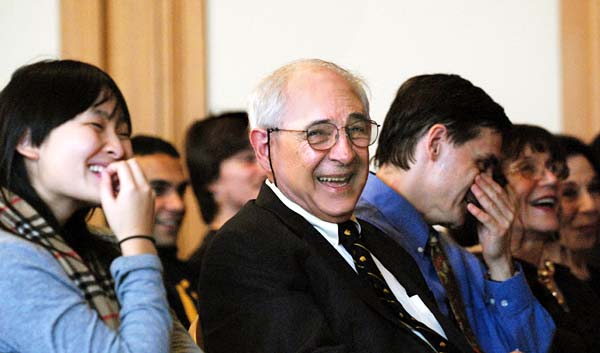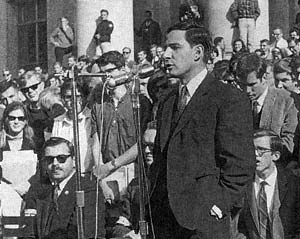 Surrounded by students and family members, John Searle celebrated his 50th anniversary on the philosophy faculty at a department celebration earlier this year. (Peg Skorpinski photo)
Surrounded by students and family members, John Searle celebrated his 50th anniversary on the philosophy faculty at a department celebration earlier this year. (Peg Skorpinski photo)Plugging away at the riddle of consciousness
John Searle, world-renowned philosopher and disaffected FSM backer, marks a half-century at Cal
| 23 April 2009
BERKELEY — Looking back on his five decades as a philosopher of language and the mind, John Searle wishes he'd emulated the industriousness of giants like Hume and Kant — devoting a bit more time to solving the mystery of consciousness, that is, and a bit less to barreling down snow-covered mountains.
"If I had it to do over, maybe I wouldn't do 30 days skiing," confides Searle, who ascended the heights of his discipline even as he set aside the equivalent of a month each year for ski trips with his wife to the Sierra, or occasionally to Vail or Aspen, near his hometown of Denver. "Maybe 20 days — I wouldn't give it up altogether."
To his dismay, in 2009 — his 50th year as a full-time Berkeley faculty member — the still-vigorous Searle squeezed in only 15 days of skiing before breaking his right arm in four places. Sporting a sling in his small, first-floor office in Moses Hall, he laments that the fracture resulted not from a spill on the slopes, but from an encounter with a sidewalk.
Berkeley's proximity to good skiing — an activity he regards as "the closest thing to sex" — is partly why he came here in 1959 from Oxford University, where he'd gone as a Rhodes Scholar at 19 and stayed to teach while earning his Ph.D.
"I came to Berkeley because I was told at Oxford that this was the world's best university," he makes clear. "But I have to say, it was not a minor factor for me that it is the only great university within reasonable driving distance of good skiing." Twice, he notes, he's been offered jobs at Stanford, which he calls "a wonderful university. But each time I thought, 'It's an hour more driving each way.'"
Searle has, in fact, found time to be the most public of public intellectuals, from his solidarity with the Free Speech Movement in 1964 — he was the first tenured faculty member to take up the cause, and among the first to break with it — to his longstanding dispute with the late deconstructionist philosopher Jacques Derrida and his acolytes over what Searle, writing in the New York Review of Books, once called their attack on "the concern with truth, rationality, logic, and 'the word' that marks the Western philosophical tradition."
 As a junior faculty member, Searle (center, at mike) addressed a Free Speech Movement rally in front of Sproul Hall in December 1964.
(Courtesy of the Bancroft Library)
As a junior faculty member, Searle (center, at mike) addressed a Free Speech Movement rally in front of Sproul Hall in December 1964.
(Courtesy of the Bancroft Library)A man of the world as much as of the mind, Searle was a regular on the PBS program World Press from 1960 to 1977. In the FSM's wake he served as an adviser on student unrest for two presidential commissions and a special committee of the American Council of Education, and authored the 1971 book The Campus War: A Sympathetic Look at the University in Agony.
His renown as a philosopher grew exponentially in the 1980s with the publication of his "Chinese room" argument, which purported to show that computers — no matter how "intelligent" — lack the "understanding" associated with the minds of sentient creatures. (It was, he says, "the single most famous argument I ever put forward, and it's routinely misunderstood" — proving that "you can become famous while being misunderstood.") In 1984 the BBC boosted him into the realm of household names by broadcasting his Reith Lectures, a radio series that had previously featured such acclaimed thinkers as Bertrand Russell, Arnold Toynbee, Robert Oppenheimer, George Kennan, and John Kenneth Galbraith.
Even after five decades of writing, lecturing, and teaching, Searle still warms to the task of discussing his work. He speaks quickly and somewhat breathlessly, as though navigating a slalom.
"For me, there's a single, overriding question in contemporary philosophy," he explains. "And that is, how do we make consistent what we know about ourselves from the sciences — from biology and physics and chemistry, and especially evolutionary biology — how do we square that conception with what we think of ourselves as human beings?
"The world consists of physical particles and fields of force, that's it," Searle continues. "But we think we have free will, we're conscious, we have rationality, we perform speech acts, we form political and social groups, we have aesthetic and moral values. Now how do you get those two pictures to fit together — the picture of us as basically hunks of matter, and the picture of us as conscious, free-will-having, speech-act-performing, rational, social, political, aesthetic, ethical animals? That's really what I've been writing about for the past 50 years in different ways."
An engineering approach
Searle's mother was an M.D., his father an electrical engineer. As a result, he says, "I tended to take a kind of engineering, practical approach to a lot of philosophical questions," including mind-bogglers like the nature of consciousness.
"You start small, and you then develop," he says. "You start with the idea, Okay, we are biological beasts, how can we be conscious? Then you write down what you know about your own consciousness. ... Then you figure out, Okay, consciousness is created by processes in the brain, and it's going on right there in the brain — right now you and I are having conscious processes in our brains.
"Okay, but now human beings have this remarkable capacity in consciousness, namely, they are able to acquire languages — what the hell is a language? But once you've got a language, all kinds of other things become possible. All kinds of ways of representing the real world in language can be done that couldn't be done by an animal that only was conscious but had no language."
Add to that what he terms "collective intentionality" — the way humans cooperate to create social institutions — "and all hell breaks loose."
"Then," he explains, "you can do all kinds of things you couldn't do otherwise. You can create money, and property, and government, and marriage, and the Republican Party and the Democratic Party, and universities and cocktail parties and summer vacations and all those things that matter to us. Those are all human social creations. And they have a specific logical structure, which I've described in two books."
To Searle, the fact of subjective experience does not lead to the conclusion — shared, he suggests, by both philosophers of postmodernism and campus proponents of multiculturalism — that there is no objective reality, or that "Bugs Bunny is as good as Shakespeare," Searle shorthand for the view that academy-sanctioned "reading lists of approved books" are "a form of oppression."
"I'm fighting against any kind of relativism, or social constructionism, that says what you think of as the real world is just a social construction," he says. "I want to fight against that idea, that there's no such thing as reality. You bet there's such a thing as reality."
Then, indicating his broken arm, he adds: "I just ran into it the other day."
Liberal values
Searle, who in 2003 dubbed affirmative action "a disaster" — responsible, he told California magazine, for "a sizable number of people who were not prepared to do college work" being admitted to Berkeley before Prop. 209 outlawed the practice in 1997 — laughs when he notes his political views have been labeled as "to the right of Genghis Khan." He insists that he still clings to "what, in the '50s, were called liberal values," namely "a reformist conception of social change in democracies."
"The last political candidate that I ever really approved of," he says, "was Adlai Stevenson."
He was drawn to the FSM — led by one of his students, Mario Savio — due in part to the university's refusal to allow him, while still an untenured assistant professor in 1962, to speak at a campus screening of a film on the Red-hunting House Un-American Activities Committee. "They did things to me that are inconceivable nowadays, and one of the reasons is that the FSM succeeded," he says. "We beat 'em."
But the '50s liberal soon found himself at odds with the student activists of the '60s. "I thought that because these people seemed to be on the same side as me, they shared my values," he recalls. "A lot of them did not. Free speech was a convenient rhetorical device to try to pursue a general radical agenda. But they didn't believe in free speech for racists, or for fascists. They didn't believe in free speech for Adolf Hitler.
"I believe in free speech for everybody — yes, if you don't believe that Adolf Hitler's entitled to free speech, you don't believe in free speech. And you'd be surprised how many people don't believe in free speech."
Speech, to Searle, "is in our very nature, our biological character" as "speech-act-performing animals." But it's more than that, he insists: "It is one of the most valuable aspects of humanity, this human capacity for thought and expression and language."
It is also, he admits, one of the things that has kept him at Berkeley for 50 years, long past the time when most academics have retired. "I'm a natural-born ham," he says. "I mean, I love having live audiences. Give me an audience and I'll give 'em a lecture."
That's particularly true in the case of Berkeley undergrads, who flock to the two upper-division courses he usually teaches and, he says, contribute to the rigor of his philosophical writings.
"I love teaching Berkeley undergraduates," says Searle, who relishes what he calls their "respectful, skeptical enthusiasm" for learning. "It forces me to discipline my own ideas. It's wonderful just to be able to think, 'Oh, you have all these great ideas.' But if you have to explain them to intelligent young people, it forces you into a kind of clarity and self-discipline that you don't get if you're just talking to yourself."
And unlocking the riddle of consciousness, he admits, "is a bitch. It's very hard to get an account of it."
Yet Searle, with his trademark self-confidence, has no doubt a solution will be found to the problem of how consciousness — and all that flows from it, from love, pain, and politics to the rush of barreling down a ski slope — derives from the biological workings of neurons and synapses firing in the brain.
"I've written 18 books, a couple of hundred articles," he observes good-naturedly, reflecting on a half-century devoted to answering that question. "I'm off to a good start."

